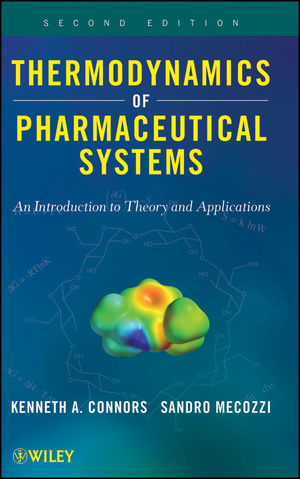Thermodynamics of Pharmaceutical Systems: An introduction to Theory and Applications, 2nd EditionISBN: 978-0-470-42512-1
Hardcover
384 pages
January 2010
 This is a Print-on-Demand title. It will be printed specifically to fill your order. Please allow an additional 10-15 days delivery time. The book is not returnable.
|
||||||
"In this 2nd edition, Professor Connors continues his career-long
commitment to ensuring that pharmacy students comprehend the
complexity of the chemistry that is so central to the practice of
pharmacy and the overall disciplines that comprise the
Pharmaceutical Sciences. While this book will continue to be
invaluable in those instances where required or elective courses
focused on mechanisms and pharmaceutical systems remain a part of
the Professional Pharmacy curriculum, it also could prove to be a
unique resource for first year pharmaceutics graduate students who
enter these programs with undergraduate majors in the biological,
rather than the chemical sciences.... Consistent with the treatment
of thermodynamics, kinetics and analytical chemistry in previous
textbooks, the authors lay out a logical systematic approach that
allow students to focus on basic definitions and principles, which
then build an understanding through increasingly complex
problems.... While this text was developed for pharmacy students,
its applicability to first year graduate students is noteworthy.
The pharmaceutical sciences have always struggled with the varied
backgrounds of a diverse student population and in most cases
background material in either the physical chemical or biological
sciences, is desirable depending upon their undergraduate
backgrounds. With the increasingly biological orientation of the
pharmaceutical sciences a large number of incoming students have
not had the basics of physical chemistry or thermodynamics which
are fundamental to drug discovery, design and understanding
mechanism of transport and action in the body. In addition, the
industry as well as the Food and Drug Administration through its
Critical Path initiative express an urgent need to move towards
much scientific orientation of formulation and manufacture to try
to reduce the extensive time needed to develop, test and eventually
market a drug often due to historic trial and error processes based
upon previously approved processes. This textbook could fill that
void nicely in many graduate programs and lay the foundation for
higher level courses."
—Dr. Jordan Cohen, Vice President for Research, University of Iowa
—Dr. Jordan Cohen, Vice President for Research, University of Iowa



